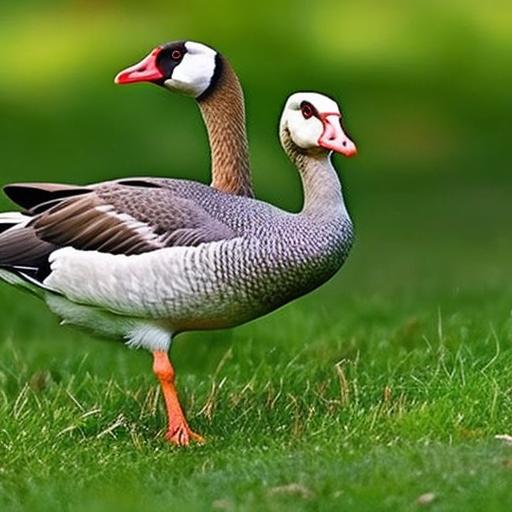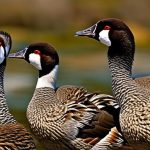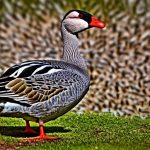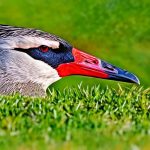Geese can be a major nuisance for homeowners, especially when it comes to maintaining a beautiful lawn. These large birds are known for their voracious appetites and can cause significant damage to grass, plants, and landscaping. They leave behind unsightly droppings that can be difficult to clean up and can also pose health risks to humans and pets. Additionally, geese can be aggressive and territorial, making it unpleasant for homeowners and their families to enjoy their outdoor spaces.
One of the main ways geese damage lawns is through overgrazing. They have a tendency to eat grass down to the roots, leaving behind bare patches that are susceptible to weeds and erosion. Geese also have a habit of pulling up grass with their bills, which can further damage the lawn. Their droppings contain high levels of nitrogen, which can burn the grass and create unsightly brown patches. Overall, geese can quickly turn a lush green lawn into a barren wasteland if left unchecked.
Key Takeaways
- Geese can cause damage to your lawn and create unsanitary conditions.
- Geese are attracted to lawns with easy access to water and food sources.
- Natural deterrents such as certain plants and landscaping can help keep geese away.
- Physical barriers like fences and netting can be effective in keeping geese out.
- Repellents, scare tactics, and humane solutions can also be used to deter geese.
Understanding Geese Behavior: What Attracts Them to Your Lawn
To effectively manage geese on your lawn, it’s important to understand why they are attracted to it in the first place. Geese are drawn to lawns because they provide easy access to food and water sources. They prefer short grass that allows them to easily spot predators and have a clear line of sight. Lawns near bodies of water, such as ponds or lakes, are particularly attractive to geese as they provide both food and a place to rest.
Geese are social animals and tend to congregate in large groups called flocks. When one goose finds a suitable feeding ground, others will often follow. They have a keen sense of sight and can spot potential food sources from great distances. Geese are also attracted to lawns that offer protection from predators, such as tall shrubs or trees. They prefer open spaces where they can easily spot any approaching danger.
Natural Deterrents: Using Plants and Landscaping to Keep Geese Away
One of the most effective ways to deter geese from your lawn is by using plants and landscaping features that they find unappealing. Certain plants are known to repel geese due to their taste, smell, or texture. These include tall grasses, such as switchgrass or fountain grass, which can create a physical barrier that makes it difficult for geese to access the lawn. Other plants that can deter geese include yarrow, lavender, and rosemary, which have strong scents that geese find unpleasant.
In addition to using specific plants, landscaping can also discourage geese from landing on your lawn. Creating uneven terrain with hills or mounds can make it difficult for geese to walk and graze comfortably. Installing rocks or gravel in certain areas can also deter geese as they prefer grassy surfaces. Adding decorative fencing or hedges around the perimeter of your lawn can create a physical barrier that prevents geese from accessing the area.
Physical Barriers: Fences, Netting, and Other Obstacles to Keep Geese Out
If natural deterrents are not enough to keep geese away, physical barriers can be an effective solution. Fences are one of the most common types of barriers used to keep geese out of lawns. They should be at least three feet high and have small openings to prevent geese from squeezing through. Electric fences can also be used as a deterrent, but they should be installed by a professional to ensure safety.
Netting is another option for keeping geese away from your lawn. It can be installed over the entire lawn or specific areas where geese tend to congregate. The netting should be secured tightly to prevent geese from getting caught or tangled in it. Other obstacles, such as scarecrows or decoy predators, can also be effective in deterring geese. These should be moved regularly to prevent geese from becoming accustomed to them.
While physical barriers can be effective in keeping geese away, they do have some drawbacks. Fences and netting can be expensive to install and may not be aesthetically pleasing. They can also make it difficult for homeowners to access their lawn or perform maintenance tasks. Additionally, geese are intelligent animals and may find ways to overcome or bypass physical barriers if they are determined enough.
Repellents: Chemical and Electronic Solutions to Deter Geese
Repellents can be an effective way to deter geese from your lawn without the need for physical barriers. There are several types of repellents available, including chemical and electronic solutions. Chemical repellents typically contain ingredients that geese find unpleasant or irritating, such as methyl anthranilate or capsaicin. These repellents can be sprayed directly onto the grass or applied to specific areas where geese tend to congregate.
Electronic repellents use sound or light to deter geese from landing on your lawn. Sonic devices emit loud noises that mimic the distress calls of geese, which can scare them away. These devices should be placed strategically around the lawn to create a sense of danger for the geese. Light-based repellents use flashing lights or lasers to create a visual deterrent for geese. These devices should be placed in areas where geese are likely to land or graze.
It’s important to note that while repellents can be effective in deterring geese, they may need to be used in conjunction with other methods for optimal results. Geese can become habituated to certain repellents over time, so it’s important to rotate or vary the types of repellents used. Additionally, some repellents may not be suitable for use in residential areas or may have adverse effects on other wildlife, so it’s important to follow the manufacturer’s instructions and consider the potential impact on the environment.
Scare Tactics: Using Sound, Motion, and Visual Cues to Scare Geese Away

Scare tactics can be an effective way to scare geese away from your lawn without the need for physical barriers or repellents. Geese are naturally wary of potential threats and can be easily scared off by certain sounds, motions, and visual cues. One of the most common scare tactics is the use of noise-making devices, such as air horns or whistles. These devices can startle geese and make them think there is a predator nearby.
Motion-based scare tactics can also be effective in deterring geese. Windsocks or flags that move with the wind can create a sense of movement that makes geese uncomfortable. These should be placed strategically around the lawn to create a visual deterrent. Another motion-based tactic is the use of decoys, such as fake predators or other animals that geese perceive as a threat. These decoys should be moved regularly to prevent geese from becoming accustomed to them.
Visual cues can also be used to scare geese away from your lawn. Reflective tape or shiny objects, such as aluminum foil or CDs, can create flashes of light that make geese uncomfortable. These should be hung or placed in areas where geese are likely to land or graze. Scarecrows can also be effective in deterring geese, especially if they are moved regularly to create a sense of unpredictability.
Humane Solutions: Creating Alternative Habitats and Feeding Stations for Geese
For those who prefer a more humane approach to managing geese, creating alternative habitats and feeding stations can help reduce the number of geese on your lawn. Geese are attracted to lawns because they provide easy access to food and water sources. By providing alternative habitats and feeding stations, you can redirect geese away from your lawn and towards more suitable areas.
Creating a designated feeding area for geese can help reduce their impact on your lawn. This can be done by setting up a small area with bird feeders or trays filled with birdseed or cracked corn. By providing a consistent food source in a specific location, you can encourage geese to feed there instead of on your lawn. It’s important to note that this method may not completely eliminate geese from your lawn, but it can help reduce their numbers and minimize the damage they cause.
Creating alternative habitats for geese can also help reduce their impact on your lawn. This can be done by planting native grasses or creating wetland areas near your property. These habitats provide geese with the food and water sources they need while keeping them away from your lawn. It’s important to consult with local wildlife experts or conservation organizations to ensure that the habitats you create are suitable for geese and other wildlife in your area.
Working with Your Community: Encouraging Responsible Goose Management Practices
Managing geese effectively often requires a community-wide effort. Geese are highly adaptable and can quickly become accustomed to certain deterrents or management practices. By working together with your neighbors and community, you can create a more effective and sustainable approach to managing geese.
One way to encourage responsible goose management practices in your community is by educating your neighbors about the impact of geese on lawns and the environment. Many people may not be aware of the damage that geese can cause or the potential health risks associated with their droppings. By sharing information and resources, you can help raise awareness and encourage others to take action.
Another way to promote responsible goose management practices is by advocating for the implementation of local ordinances or regulations that address the issue. These may include restrictions on feeding geese, requirements for property owners to take measures to deter geese, or guidelines for the humane management of geese. By working with local government officials and community organizations, you can help create a more comprehensive and coordinated approach to managing geese in your area.
Long-Term Strategies: Maintaining a Goose-Free Lawn Year-Round
While there are many short-term solutions to managing geese on your lawn, it’s important to implement long-term strategies to maintain a goose-free lawn year-round. Geese are migratory birds and will often return to the same areas year after year. By implementing long-term strategies, you can discourage geese from returning to your lawn and minimize the need for constant management.
One long-term strategy is to modify the landscape to make it less attractive to geese. This can be done by creating uneven terrain, planting tall grasses or shrubs, or installing rocks or gravel in certain areas. These modifications can make it difficult for geese to access the lawn and discourage them from returning.
Another long-term strategy is to create a habitat that is less appealing to geese. This can be done by planting native grasses or creating wetland areas near your property. These habitats provide geese with the food and water sources they need while keeping them away from your lawn. It’s important to consult with local wildlife experts or conservation organizations to ensure that the habitats you create are suitable for geese and other wildlife in your area.
Finding the Right Balance Between Geese and Your Lawn
Managing geese on your lawn can be a challenging task, but with the right strategies and approaches, it is possible to find a balance between managing geese and maintaining a healthy lawn. By understanding geese behavior and what attracts them to your lawn, you can implement effective deterrents and management practices. Whether you choose natural deterrents, physical barriers, repellents, scare tactics, or humane solutions, it’s important to consider the long-term impact and sustainability of your chosen methods.
Working with your community and advocating for responsible goose management practices can also help create a more comprehensive and coordinated approach to managing geese in your area. By educating your neighbors, raising awareness, and implementing local ordinances or regulations, you can create a more effective and sustainable solution to the geese problem.
In the end, it’s important to remember that geese are a part of our natural environment and play an important role in ecosystems. While they can be a nuisance for homeowners, it’s important to find a balance between managing geese and maintaining a healthy lawn. By implementing the right strategies and approaches, you can minimize the impact of geese on your lawn while still respecting their presence in our environment.
If you’re looking for more tips on how to keep geese off your lawn, you might also be interested in learning about the best location to put your chicken coop. Poultry Wizard has a helpful article on their website that discusses where to put a chicken coop for optimal results. By understanding the ideal placement for your coop, you can create a barrier that not only keeps geese away but also provides a safe and comfortable environment for your chickens. Check out the article here to learn more.
FAQs
What are some effective ways to keep geese off your lawn?
There are several effective ways to keep geese off your lawn, including using decoys, installing fencing or netting, using repellents, and modifying the landscape.
What are some natural repellents that can be used to keep geese away?
Some natural repellents that can be used to keep geese away include planting certain types of vegetation, using noise deterrents, and using visual deterrents such as reflective tape or balloons.
What are some common mistakes people make when trying to keep geese off their lawn?
Some common mistakes people make when trying to keep geese off their lawn include using ineffective or outdated methods, not being consistent with their efforts, and not addressing the root cause of the problem.
Is it legal to harm or kill geese to keep them off your lawn?
No, it is not legal to harm or kill geese to keep them off your lawn. Geese are protected under federal law, and there are strict regulations in place to ensure their safety and well-being.
What should I do if I have a persistent geese problem on my lawn?
If you have a persistent geese problem on your lawn, it is recommended that you contact a professional wildlife control service. They can assess the situation and provide effective and humane solutions to keep geese away from your property.
Meet Walter, the feathered-friend fanatic of Florida! Nestled in the sunshine state, Walter struts through life with his feathered companions, clucking his way to happiness. With a coop that’s fancier than a five-star hotel, he’s the Don Juan of the chicken world. When he’s not teaching his hens to do the cha-cha, you’ll find him in a heated debate with his prized rooster, Sir Clucks-a-Lot. Walter’s poultry passion is no yolk; he’s the sunny-side-up guy you never knew you needed in your flock of friends!







